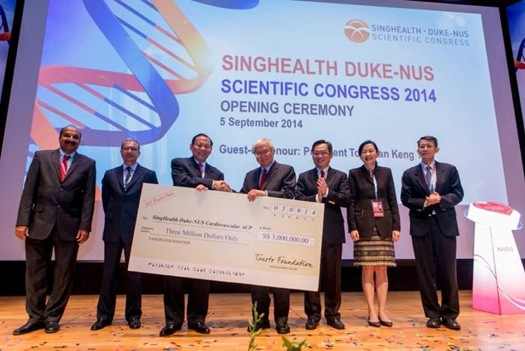Tanoto Foundation Professor Leads Heart Disease Study
Tanoto Foundation Professor, Stuart Cook, is currently leading a team of scientists in the study a heart condition called...

Latest updates on what's happening in RGE Group

The National Heart Research Institute Singapore (NHRIS) was launched by President Tony Tan at the SingHealth Duke-NUS Scientific Congress 2014, a biennial Congress that showcases the latest medical developments and scientific advances in clinical care, research and medical education. (See more here)
NHRIS is a joint venture by the National Heart Centre Singapore and Duke-National University Singapore (NUS). It seeks to be a leading facility in cardiovascular research in Singapore and the Asian region, and is helmed by renowned cardiovascular research expert Professor Stuart Cook. NHRIS’ key research focus areas are heart function and genetics, regenerative medicine and metabolic heart disease and cardiac imaging.
Research efforts were given a boost with a gift of S$3 million from Tanoto Foundation. Of this amount, S$2.5 million will be used to set up the Tanoto Foundation Professorship in Cardiovascular Medicine, and S$500,000 will fund the Tanoto Foundation Initiative for Genetics and Stem Cell research.
Founder and Chairman of Tanoto Foundation Board of Trustees, Mr Sukanto Tanoto, presented the S$3 million gift cheque to President Tony Tan at the Congress, who received it in his capacity as Patron for Duke-NUS Development Committee. The gift will support research in human genetics to identify new ways of diagnosing, stratifying and testing patients with cardiovascular diseases, thereby allowing early prevention for those who are genetically pre-disposed to the disease.
This gift comes on the back of two earlier donations by Tanoto Foundation to Duke-NUS in 2009 and 2013, to set up professorships and further research in diabetes (S$5 million) and oncology (S$3 million) respectively.
Speaking at the launch, President Tony Tan Keng Yam said: “NHRIS will serve as a dedicated research institute to improve treatment and seek cures through research for cardiovascular diseases. It will focus on pertinent research themes in cardiovascular medicine, including heart and blood vessel functions, genetics and metabolic heart diseases.”